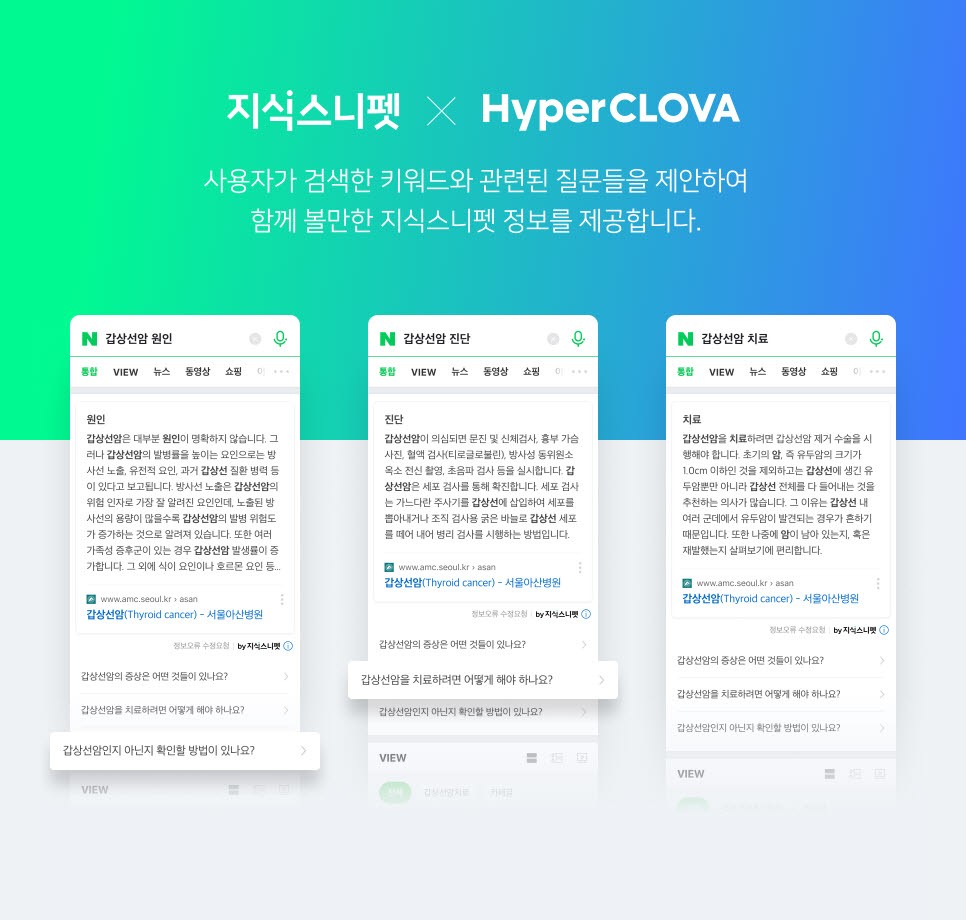
Naver Search even suggests questions with Hyperscale AI. It is expected to increase the continuity of information search further.
From the 21st of this month, Naver will add a new 'question suggestion' area at the bottom of the knowledge snippet. It is a service that suggests various questions related to keywords searched by users by utilizing Naver's super-scale artificial intelligence (AI) 'HyperCLOVA' technology.
Knowledge Snippet is a service that automatically extracts and edits information that meets the user's search intent from among numerous documents such as knowledge encyclopedias, news, and blogs, and displays them at the top of the search results.
HyperCLOVA technology is applied to the question suggestion function added on the 21st. For example, when a user enters 'thyroid pain' in the Naver search bar, under the knowledge snippet that appears at the top, it selects and displays questions that the user may be interested in, such as the cause of thyroid cancer and the treatment of thyroid cancer. This query is generated as a natural interrogative sentence using HyperCLOVA technology.
A Naver official explained, “Users can identify and select what information they want to find next through the generated related question.Naver plans to apply the question suggestions first, focusing on diseases or social policy topics. By improving the model, we plan to apply question suggestions to various keywords in the future.
Naver said, “Through this improvement, we will go one step further from quickly finding the answer you want when you search for inquiries with clear search intent. It will be possible to explore.”HyperCLOVA is a first Koreansuper-scale AI company, unveiled by Naver in May of this year. It is larger than OpenAI's super giant AI 'GPT-3' unveiled in 2020. HyperCLOVA parameters are 204 billion, exceeding GPT-3 175 billion.
It is differentiated in that it is an AI model based on Korean (Hangul). According to Naver, the amount of Korean data learned by HyperCLOVA is 560 billion tokens, which is 6500 times larger than GPT-3. 93% of the learned languages for GPT-3 is English, whereas 97% of the learned language in HyperCLOVA is Korean.
HyperCLOVA is making academic and industrial achievements in the field of Hangul and Korean AI. Shortly after the release of HyperCLOVA in May, Naver introduced a function that corrects or recommends appropriate search terms if a user enters an incorrect search term in a search service.
At the 'Hangul and Korean Information Processing Conference (HCLT) 2021' held this month, Naver presented a total of 15 Korean language processing technologies and research results as essays, this was 2.5 times more than last year. Some of these research results are already being applied to Naver services.
By Staff ReporterSi-so Kim siso@etnews.com